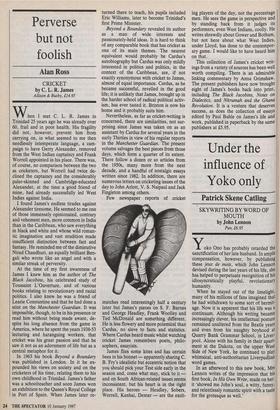Perverse but not foolish
Alan Ross
CRICKET by C. L. R. James Allison & Busby, £14.95 When I met C. L. R. James in Trinidad 25 years ago he was already over 60, frail and in poor health. His fragility did not, however, prevent him from carrying on, in what seemed to me then needlessly intemperate language, a cam- paign to have Gerry Alexander, removed from the West Indian captaincy and Frank Worrell appointed in his place. There was, of course, no comparison between the two as cricketers, but Worrell had twice de- clined the captaincy and the considerably paler-skinned and Cambridge-educated Alexander, at the time a good friend of mine, had already successfully led West Indies against India.
I found James's endless tirades against Alexander tiresome. He seemed to me one of those immensely opinionated, contrary and vehement men, more common in India than in the Caribbean, who saw everything in black and white and whose wild roman- tic imagination and vast erudition made insufficient distinction between fact and fantasy. He reminded me of the diminutive Nirad Chaudhuri, an equally brilliant Ben- gali who wrote like an angel and with a similar streak of perversity.
At the time of my first awareness of James I knew him as the author of The Black Jacobins, his celebrated study of Toussaint L'Ouverture, and of various books relating to revolutionary and racial politics. I also knew he was a friend of Learie Constantine and that he had done a stint on the Manchester Guardian. It was impossible, though, to be in his presence or read him without being made aware, de- spite his long absence from the game in America, where he spent the years 1938-53 lecturing and haranguing workers, that cricket was his great passion and that he saw it not as an adornment of life but as a central metaphor for it.
In 1963 his book Beyond a Boundary was published in London. In it he ex- pounded his views on society and on the cricketers of his time, relating them to his own childhood in Trinidad. James's father was a schoolteacher and soon James won an exhibition to the Queen's Royal College in Port of Spain. When James later re-
turned there to teach, his pupils included Eric Williams, later to become Trinidad's first Prime Minister.
Beyond a Boundary revealed its author as a man of wide interests and passionately-held ideas. It is hard to think of any comparable book that has cricket as one of its main themes. The nearest equivalent would probably be Cardus's autobiography but Cardus was only mildly interested in politics and politics, in the context of the Caribbean, are, if not exactly synonymous with cricket to James, almost of equal importance. Cardus, as he became successful, revelled in the good life; it is unlikely that James, brought up in the harder school of radical political activ- ism, has ever tasted it. Brixton is now his home and it probably suits him.
Nevertheless, as far as cricket-writing is concerned, there are similarities, not sur- prising since James was taken on as an assistant by Cardus for several years in the early Thirties in view of his regular reports in the Manchester Guardian. The present volume salvages the best pieces from those days, which form a quarter of its extent. There follow a dozen or so articles from the 1950s, many more from the next decade, and a handful of nostalgic essays written since 1982. In addition, there are numerous letters on cricketing issues of the day to John Arlott, V. S. Naipaul and Jack Fingleton among others.
Few newspaper reports of cricket matches read interestingly half a century later but James's pieces on S. F. Barnes and George Headley, Frank Woolley and Ted McDonald are something different. He is less flowery and more polemical than Cardus, no slave to facts and statistics. Where Cardus heard music whilst watching cricket James remembers poets, philo- sophers, essayists.
James flies some kites and has certain bees in his bonnet — apparently sharing C. B. Fry's idealistic but eccentric notion that you should pick your Test side early in the season and, come what may, stick to it — and on South African-related issues seems inconsistent, but his heart is in the right place. His heroes — Headley, Sobers, Worrell, Kanhai, Dexter — are the excit-
ing players of the day, not the percentage men. He sees the game in perspective and by standing back from it judges its performers, even West Indians, coolly. He writes shrewdly about Gower and Botham, but not here about what West Indies, under Lloyd, has done to the contempor- ary game. I would like to have heard him on that.
This collection of James's cricket writ- ings from a variety of sources has been well worth compiling. There is an admirable linking commentary by Anna Grimshaw, The present publishers have now brought eight of James's books back into print, including The Black Jacobins, Notes on Dialectics, and Nkrumah and the Ghana Revolution. It is a venture that deserves success, as does the collection of essays edited by Paul Buhle on James's life and work, published in paperback by the same publishers at £5.95.










































 Previous page
Previous page